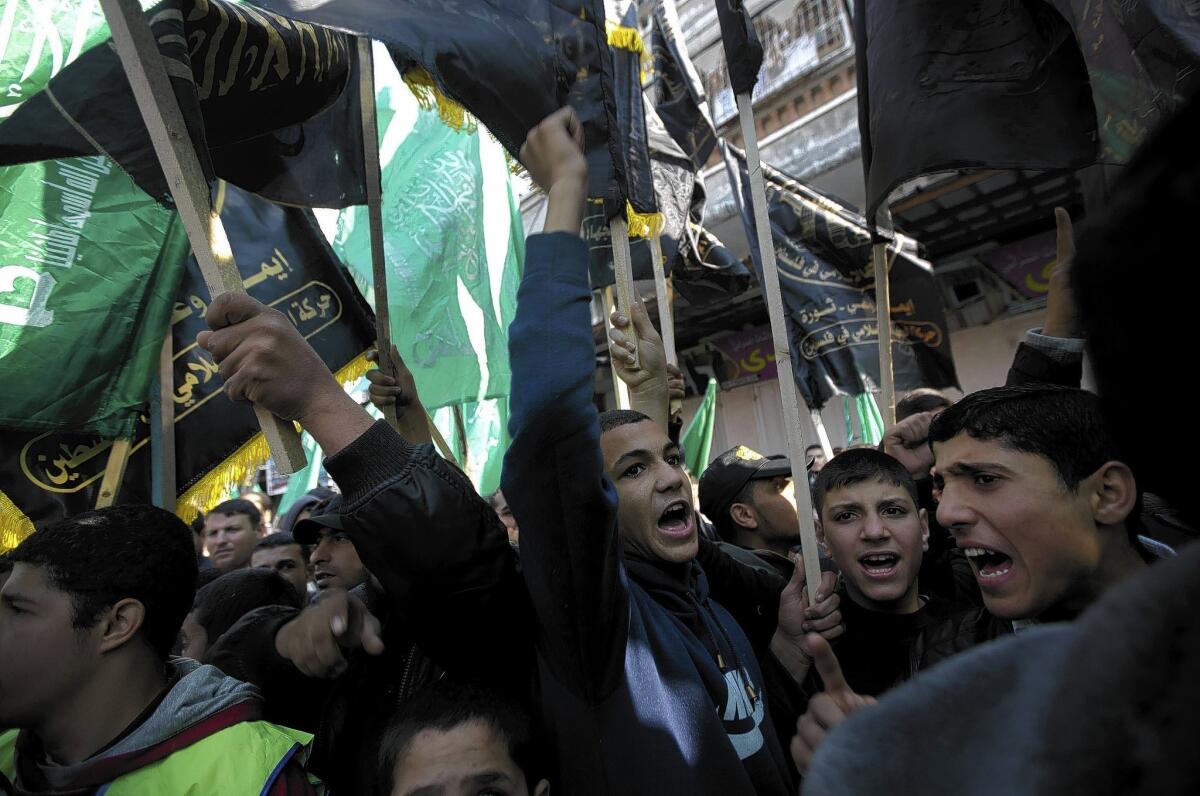Palestinians in Gaza Strip resent being left out of peace talks

GAZA CITY — Like many Palestinians, Marwan Hissi has closely followed reports of peace negotiations between Israeli Prime Minister Benjamin Netanyahu and Palestinian Authority President Mahmoud Abbas.
An unemployed father of five living in a refugee community in the Gaza Strip, Hissi says he has a question for American negotiators leading the talks: “Where’s Hamas?”
The Islamic militant movement, which seized control of Gaza in 2007, has been excluded from the process as U.S. officials work out a preliminary agreement on key issues in the long-running Israeli-Palestinian conflict. Israel, the United States and the European Union refuse to engage with Hamas, which does not recognize Israel’s right to exist and which they consider a terrorist group.
While all eyes are trained on Netanyahu and Abbas as U.S. Secretary of State John F. Kerry prepares to present a deal, the issue of Hamas, which could make or break the implementation of any agreement, looms uncomfortably in the background.
Hamas has denounced the negotiations, saying Abbas, whose Fatah party controls the West Bank, does not have authority to bargain on behalf of all Palestinians.
“Any outcome or agreement that is reached does not commit or represent our people,” Hamas spokesman Sami abu Zuhri said recently in an interview in Gaza City. “We believe that armed resistance is the only way to get our land back.”
Among the key points for Israel in the negotiations is a provision that would secure Palestinian recognition of Israel as a Jewish state and deny Palestinian refugees the right to return to their pre-1948 homes.
Abbas is opposed to recognizing the Jewish character of the land but appears more flexible on the right-of-return issue, saying he does not believe all Palestinians should get to go back to their former homes. Hamas leaders, however, say they would reject any treaty that denies rights to Palestinian refugees.
At a Friday rally in opposition to the peace talks, Hamas officials said they also oppose an Abbas proposal to have an international security force, such as the North Atlantic Treaty Organization, patrol a future Palestinian state.
Israeli skeptics of the negotiations say there is little point in reaching an agreement that the Palestinian faction controlling Gaza would ignore. Israeli Economy Minister Naftali Bennett, a right-wing member of Netanyahu’s ruling coalition, said in December that negotiations that don’t include Gaza’s leaders are “a joke.”
“Imagine you’re negotiating over a car with someone who owns only half the car, and the owner of the other half says he won’t recognize any agreement you reach,” Bennett told the Times of Israel. “You give him all the money but get only half the car.”
Analysts say American negotiators are hoping a peace deal would bolster Abbas at a time when Hamas is under increasing pressure to reconcile with Palestinian leaders in the West Bank.
U.S. officials “expect to force Hamas into a corner by reaching an Abbas-Netanyahu deal and they hope that Hamas will then calculate that capitulating quietly is its best option,” said Nathan Thrall, a Middle East analyst with the International Crisis Group who has advised negotiators working on the deal.
Thrall, however, deemed that scenario “a fantasy” and said the American plan includes “a lot of wishful thinking when it comes to what to do about Gaza and Hamas, and very little strategy.”
There is no doubt that this is a difficult period for Hamas and Gaza, the impoverished war-torn enclave a quarter the size of the city of Los Angeles that is bordered by two hostile nations and the Mediterranean Sea. Hamas, formed in the 1980s as a resistance movement that carried out kidnappings and suicide bombings against Israel, now finds itself struggling to run a state and prevent potentially destabilizing violence.
Last summer, Hamas lost a close ally when Egypt’s Muslim Brotherhood was forced from power. Egyptian military leaders, who openly disdain Hamas, have closed nearly all of the tunnels used to smuggle food, fuel, weapons and construction materials into Gaza, which remains under an Israeli blockade.
Hamas, which won a majority of seats in the Palestinian parliament in 2006, once reaped hundreds of millions of dollars in unofficial tax revenue from the tunnels each year. Now it is struggling to pay its 45,000 employees, most of whom haven’t received full wages since August. Construction has stalled and property crimes have increased. More than half the population rely on United Nations food aid.
“We’re not sure how much longer the status quo can last,” said a Western aid worker who asked not to be identified for fear of retribution from Hamas.
Militants with smaller radical groups operating in Gaza recently have fired a barrage of rockets into Israel, threatening a 2012 cease-fire.
A renewal of ties with Abbas could lead to much-needed economic aid and strengthened security.
Some say Abbas has stepped up efforts to reconcile with Gaza’s leaders. On Feb. 7, he sent four senior Fatah members to Gaza for talks, a gesture Hamas Prime Minister Ismail Haniyeh greeted as “a good step in the right direction.”
American negotiators won’t discuss their strategy as it relates to Hamas. But one U.S. official who spoke on condition of anonymity because he wasn’t authorized to comment publicly said Abbas’ role in the peace talks “has shown that he is willing to make courageous decisions that he believes are in the interests of the Palestinian people.”
“By working to achieve an independent Palestinian state, President Abbas stands in stark contrast to Hamas, which is still a designated Foreign Terrorist Organization and is not serving the best interests of the Palestinian people,” the official said.
Analysts say that no matter the pressures, Hamas is unlikely to agree to support a deal that requires recognition of the Jewish state and bars a Palestinian right of return. Doing so could isolate Hamas from a core constituency: refugees who oppose a two-state solution.
“The only solution is me going back to my home,” said Hissi, the Gaza resident who believes Hamas should have a seat at the negotiating table. His father fled his village just east of the Gaza border during Israel’s 1948 war for independence.
Hamas is not the only Palestinian group to oppose Abbas’ negotiations.
Several parties that belong to the Palestine Liberation Organization, an umbrella group of which Fatah is the largest member, have also expressed their opposition to the peace talks, along with more radical militant groups and even some members of Abbas’ party.
In a post on the website of the Gatestone Institute, a foreign affairs think tank, Arab-Israeli journalist Khaled Abu Toameh said some Fatah supporters were calling for the renewal of an “armed resistance” against Israel in Arabic-language interviews.
“Kerry needs to listen to what Hamas and other groups are saying in Arabic,” Toameh wrote.
In Gaza, a leader of one of the militant groups blamed for firing rockets into Israeli territory said his organization rejects the talks and “will never accept anything but the full historical Palestinian lands.”
“You cannot negotiate with the occupier,” said Abu Ahmad, a spokesman for Islamic Jihad, who works from a Gaza City office decorated with framed photographs of men killed in battle with Israel. “What was taken by force will be retaken by force.”
Special correspondent Rushdi abu Alouf contributed to this report.
hdi abu Alouf contributed to this report.
More to Read
Start your day right
Sign up for Essential California for news, features and recommendations from the L.A. Times and beyond in your inbox six days a week.
You may occasionally receive promotional content from the Los Angeles Times.







